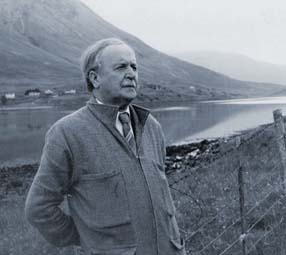1911 Sorley MacLean Born
Sorley MacLean (Scottish Gaelic: Somhairle MacGill-Eain, sometimes “MacGilleathain” in earlier publications) was born at Osgaig on the island of Raasay on 26 October 1911. At that time on Raasay, which lies between the Isle of Skye and the Scottish Mainland, Gaelic was the first language.
His grandmother, Mary Matheson (Màiri ‘ain ‘ic Sheumais ‘ic Dhòmhnaill Ruaidh) was a great influence on the young Sorley. She had moved to Raasay from the mainland in the 19th century after being evicted during the highland clearances. The young boy listened to his grandmother’s traditional songs brought from Lochalsh and Kintail.
MacLean attended the University of Edinburgh, playing shinty for the university team. He served in North Africa during World War II and was wounded on three occasions, once severely. After the war he met Renee Cameron from Inverness. They were married in Inverness on 24 July 1946. After a spell teaching in Edinburgh he returned to the Highlands to take up a teaching position there.
His early poetry were written in English, however, after writing his first Gaelic poem, An Corra-Ghridheach (“The Heron”), he decided that it was far better than his English work, and his subsequent poems were written in his native Gaelic tongue. By the mid 1930′s he had become one of Scotland’s best known Gaelic poets.
MacLean turned away from the Presbyterian faith of his community in his early teens. Like many Europeans of that day, he moved in sympathy to the far left. Much of his work touched on specifically political themes and references, and his position was Communist until the mid-1940s, although he was not a philosophical Marxist. He was also a skilled and delicate writer of love poetry.
His work in the field of Gaelic poetry at a time when very few writers of substance were working in Scottish Gaelic at all, has led to his being viewed as the father of the Scottish Gaelic renaissance.
His poetry articulated in Gaelic the crimes of the 20th century, and modernised and reinvigorated the language in the process, drawing clear and articulate analogies between such tragedies and acts of cultural genocide as the 19th century Scottish Highland Clearances, and the contemporary viciousness and injustice of events in places such as Biafra and Rwanda.
He died on 24 November 1996, aged 85 from natural causes, in his beloved Scotland.
Sorley MacLean is commemorated in Makars’ Court, outside The Writers’ Museum, Lawnmarket, Edinburgh.
For more information see: www.thesorleymacleantrust.org.uk






